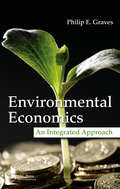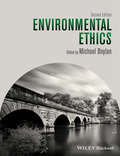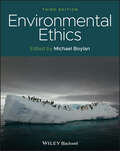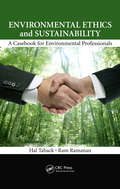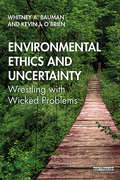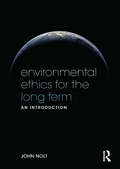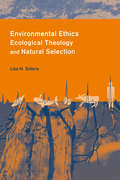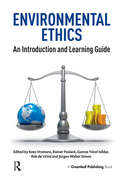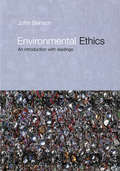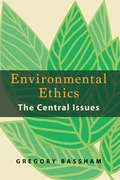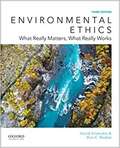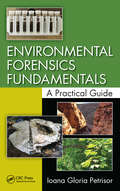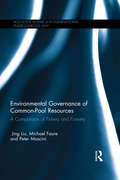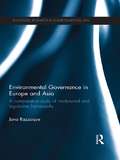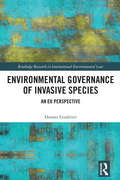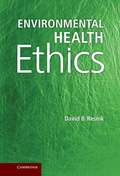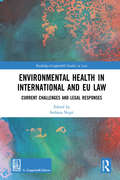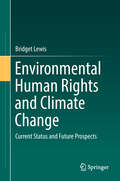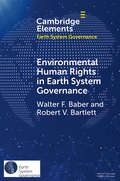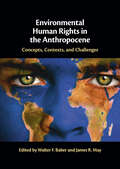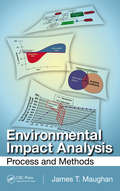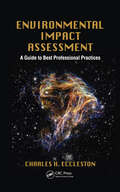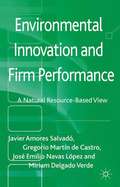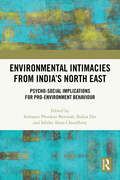- Table View
- List View
Environmental Economics: An Integrated Approach
by Philip E. GravesRigorous, yet written in a way that facilitates understanding of complex material, Environmental Economics: An Integrated Approach provides practical and working knowledge of how environmental policy analysis is developed. This is a true textbook, detailing the tools required to conduct that analysis and also discusses weaknesses in the existing me
Environmental Ethics
by Michael BoylanThe second edition of Environmental Ethics combines a strong theoretical foundation with applications to some of the most pressing environmental problems. Through a mix of classic and new essays, it discusses applied issues such as pollution, climate change, animal rights, biodiversity, and sustainability. Roughly half of the selections are original essays new to this edition.Accessible introduction for beginners, including important established essays and new essays commissioned especially for the volumeRoughly half of the selections are original essays new to this edition, including an entirely new chapter on Pollution and climate change and a new section on SustainabilityIncludes new material on ethical theory as a grounding for understanding the ethical dimensions of the environment, our interactions with it, and our place in itThe text incorporates helpful pedagogy, including extensive editorial material, cases, and study questionsIncludes key information on recent developments in the fieldPresents a carefully selected set of readings designed to progressively move the reader to competency in subject comprehension and essay writing
Environmental Ethics
by Michael BoylanThe latest edition of an essential resource in the theory and applications of environmental ethics In the newly revised Third Edition of Environmental Ethics, internationally renowned philosopher Michael Boylan delivers another accessible introduction for students new to ethics, and an invaluable reference for scholars of all levels. The anthology includes important essays, both established and contemporary, as well as eight brand-new contributions commissioned specifically for this edition. This new material is the foundation for students# understanding of the most recent ethical debates on the environment and humanity's place within it. The balanced combination of new material on recent developments in the field and well-known, foundational articles appears alongside helpful pedagogical materials, including case studies and sample questions. The book brings students up to speed on all the main themes in the area, including worldview arguments for environmentalism, the anthropocentric vs. biocentric debate, and a variety of applied environmental problems. Environmental Ethics also offers: A thorough introduction to the theoretical background of environmental ethics, including discussions of ethical reasoning, nature, and the tragedy of the commons Comprehensive explorations of eco-feminism and social justice, aesthetics, and deep ecology Practical discussions of anthropocentric and biocentric justifications in environmental ethics In-depth examinations of applied environmental problems, including climate change, animal rights, sustainability, and public policy Perfect for undergraduate and graduate students studying topics in ethics, the environment, law, and policy, Environmental Ethics will also earn a place in the libraries of philosophers with an interest in applied or environmental ethics, and industry consultants to ecologists, environmental scientists, or environmental policymakers.
Environmental Ethics and Sustainability: A Casebook for Environmental Professionals
by Hal Taback Ram RamananThe environmental professional must be educated to be ethical, and more importantly, trained through frequent participatory workshops with real-world scenarios to be able to make the right choices when faced with environmental dilemmas. This book serves as a reference and a resource casebook, presenting current real-world situations and providing perspectives to numerous environmental ethics scenarios. It provides specific guidance as to what is ethical behavior, how to judge it, and the foundations of ethical behavior in facing and resolving environmental ethical dilemmas.
Environmental Ethics and Uncertainty: Wrestling with Wicked Problems
by Whitney A. Bauman Kevin J. O'BrienThis book offers a multidisciplinary environmental approach to ethics in response to the contemporary challenge of climate change caused by globalized economics and consumption. This book synthesizes the incredible complexity of the problem and the necessity of action in response, highlighting the unambiguous problem facing humanity in the 21st century, but arguing that it is essential to develop an ethics housed in ambiguity in response. Environmental Ethics and Uncertainty is divided into theoretical and applied chapters, with the theoretical sections engaging in dialogue with scholars from a variety of disciplines, while the applied chapters offer insight from 20th century activists who demonstrate and/or illuminate the theory, including Martin Luther King, Rachel Carson, and Frank Lloyd Wright. This book is written for scholars and students in the interdisciplinary field of environmental studies and the environmental humanities, and will appeal to courses in religion, philosophy, ethics, politics, and social theory.
Environmental Ethics for the Long Term: An Introduction
by John NoltBroad in scope, this introduction to environmental ethics considers both contemporary issues and the extent of humanity's responsibility for distant future life. John Nolt, a logician and environmental ethicist, interweaves contemporary science, logical analysis, and ethical theory into the story of the expansion of ethics beyond the human species and into the far future. Informed by contemporary environmental science, the book deduces concrete policy recommendations from carefully justified ethical principles and ends with speculations concerning the deepest problems of environmental ethics. Pedagogical features include chapter outlines, annotated suggestions for further readings, the explanations of key terms when first mentioned, and an extensive glossary.
Environmental Ethics, Ecological Theology, and Natural Selection: Suffering and Responsibility
by Lisa SiderisLisa Sideris proposes a new way of thinking about the natural world, an environmental ethic that incorporates the ideas of natural selection and values the processes rather than the products of nature. Such an approach encourages us to take a minimally interventionist approach to nature. Only when the competitive realities of evolution are faced squarely, Sideris argues, can we generate practical environmental principles to deal with such issues as species extinction and the relationship between suffering and sentience.
Environmental Ethics, Ecological Theology, and Natural Selection: Suffering and Responsibility (Columbia Series in Science and Religion)
by Lisa SiderisIn the last few decades, religious and secular thinkers have tackled the world's escalating environmental crisis by attempting to develop an ecological ethic that is both scientifically accurate and free of human-centered preconceptions. This groundbreaking study shows that many of these environmental ethicists continue to model their positions on romantic, pre-Darwinian concepts that disregard the predatory and cruelly competitive realities of the natural world. Examining the work of such influential thinkers as James Gustafson, Sallie McFague, Rosemary Radford Ruether, John Cobb, Peter Singer, and Holmes Rolston, Sideris proposes a more realistic ethic that combines evolutionary theory with theological insight, advocates a minimally interventionist stance toward nature, and values the processes over the products of the natural world.
Environmental Ethics: An Introduction and Learning Guide
by Kees Vromans Rainer Paslack Gamze Yücel Isildar Rob De Vrind Jürgen Walter SimonAs the destructive consequences of environmental problems such as global warming, water scarcity and resource and biodiversity destruction have been felt ever more heavily, people are becoming more aware of the importance of and their responsibilities towards environmental protection. The causes of our problems are anthropogenic. The number of people working in what might be termed "environmental industries" or with environmental responsibilities in their day-to-day work has mushroomed. In many cases, however, individuals charged with protecting the environment have a set of empirical priorities: what *is* done, rather than moral priorities which consider what *should* be done. The need to harmonize environmental knowledge with ethical behaviour and thus achieve behavioural change and the internalization of environmentally ethical values has never been more urgent. This book, developed as part of an EU programme to diffuse the application of environmental ethics to decision-making on pollution control, is a response to the need for a restatement of environmental ethics and for a code of behaviour and set of values that can be internalised and adopted to guide the actions by individuals at the sharp end of protecting the environment: decision-makers and environmental experts/executives/staff working in municipalities and public/government organisations throughout the EU and Turkey. It is nothing short of an ethical training manual that will guide environmental experts/decision-makers in making sound judgements and decisions and will act as a bridge between environmental knowledge and environmental behaviour. The book will be essential reading for decision-makers and experts working in local authorities and governmental organisations with responsibility for environmental protection: for both graduate and postgraduate students in environment-related disciplines and for vocational education teachers with a focus on the environment.
Environmental Ethics: An Introduction with Readings (Philosophy and the Human Situation)
by John BensonPresupposing no prior knowledge of philosophy, John Benson introduces the fundamentals of environmental ethics by asking whether a concern with human well-being is an adequate basis for environmental ethics. He encourages the reader to explore this question, considering techniques used to value the environment and critically examining 'light green' to 'deep green' environmentalism. Each chapter is linked to a reading from a key thinker such as J.S. Mill and E.O. Wilson. Key features include activities and exercises, enabling readers to monitor their progress throughout the book, chapter summaries and guides to further reading.
Environmental Ethics: The Central Issues
by Gregory BasshamEnvironmental Ethics provides an accessible, lively, and up-to-date introduction to the central issues and controversies in environmental ethics. Requiring no previous knowledge of philosophy or ethical theory, the book will be of interest to students, environmental scientists, environmental policy makers, and anyone curious to know what philosophers are saying today about the urgent environmental challenges we face. The book is divided into two parts.Part One deals with theoretical issues in environmental philosophy, examining a variety of ethical and environmental theories that provide diverse and thought-provoking perspectives on critical ecological issues. Part Two turns to applied environmental ethics, addressing current debates on topics such as climate change, biodiversity loss, wilderness preservation, responsibilities to future generations, population growth, overconsumption, food ethics, and ecological activism. Features include: Clear explanations of key concepts and theories that lie at the heart of current debates in environmental ethics. A mix of theory of practice that permits readers to apply diverse theoretical perspectives to key environmental debates. A wealth of pedagogical aids, including chapter summaries, discussion questions, suggested readings, and a glossary of important terms.
Environmental Ethics: What Really Matters, What Really Works
by David Schmidtz Dan C. ShaharSignificantly revised in this third edition, Environmental Ethics: What Really Matters, What Really Works examines morality from an environmental perspective. Featuring accessible selections from classic articles to examples of cutting edge original research it addresses both theory and practice. <p><p> Asking what really matters, the first section of the book explores the abstract ideas of human value and value in nature. The second section turns to the question of what really works what it would take to solve our real world environmental problems. Moving beyond the "hype," it presents authoritative essays on applying environmental ethics to the issues that matter right now. The selections present philosophical, biological, and socially scientific approaches to the major issues. Environmental Ethics also features first hand descriptions from people who have actually been involved in wildlife and conservation initiatives.
Environmental Forensics Fundamentals: A Practical Guide
by Ioana Gloria PetrisorA Practical Guide to Environmental Crime Scene InvestigationsReleasing contaminants into the environment-whether deliberate or unintentional-can be thought of as a crime against the environment. The role of environmental forensics is to identify and prevent environmental pollution, or crimes. Environmental Forensics Fundamentals: A Practical Guide
Environmental Governance and Common Pool Resources: A Comparison of Fishery and Forestry (Routledge Research in International Environmental Law)
by Michael Faure Jing Liu Peter MasciniThis book analyses the drivers of specific common pool resource problems, particularly in fisheries and forestry, examining the way in which private and public regulation have intervened to fight the common pool resource problem by contributing to the establishment and maintenance of property rights. It focuses on the various forms of regulation that have been put in place to protect fisheries and forestry over the past decades – both from a theoretical as well as from a policy perspective – comparing the concrete interaction of legal and policy instruments in eight separate jurisdictions.
Environmental Governance in Europe and Asia: A Comparative Study of Institutional and Legislative Frameworks (Routledge Research in International Environmental Law)
by Jona RazzaqueThis book looks at environmental governance in both Asia and Europe and offers a comparative analysis of the two regions in order to provide a better understanding of the concept of ‘environmental governance’ and its status in Europe and Asia. The book assesses the legislative, institutional and participatory mechanisms which affect the overall development of environmental governance, and analyses current issues, concerns and strategies in respect of environmental governance at the local, national, and international levels. The rapid changes in economic, social and political life have had an enormous impact on Asia’s ecosystems and resources. Asian countries, in the name of economic development, are following the same environmentally destructive path their European counterparts followed in the past. The key to the environmental future of these two regions lies in the evolution of the character of governance - the ensemble of social ethics, public policies and institutions which structure how state actors and the civil society interact with the environment. This book will be valuable to scholars and students of environmental politics, EU and Asian studies, public policy, environmental law, and to decision makers and policy analysts.
Environmental Governance of Invasive Species: An EU Perspective (Routledge Research In International Environmental Law Ser.)
by Donato GualtieriThe consequences of the introduction and spread of invasive alien species in non-native ecosystems is an area of growing interest for international policymakers and regulators. Globalisation has increased the rate and magnitude of biological invasions, resulting in huge environmental, economic and social costs. Until recently, the effectiveness of international efforts to provide a coordinated response to the threat of alien invasions have been limited. This book considers the existing Multilateral Environmental Agreements and looks at the potential role of regional environmental governance, particularly in consideration of the adoption of the European Parliament and Council regulation 1143/2014 on the management and control of invasive species, to provide an effective response to this global threat.
Environmental Health Ethics
by David B. ResnikEnvironmental Health Ethics illuminates the conflicts between protecting the environment and promoting human health. In this study, David B. Resnik develops a method for making ethical decisions on environmental health issues. He applies this method to various issues, including pesticide use, antibiotic resistance, nutrition policy, vegetarianism, urban development, occupational safety, disaster preparedness and global climate change. Resnik provides readers with the scientific and technical background necessary to understand these issues. He explains that environmental health controversies cannot simply be reduced to humanity versus environment and explores the ways in which human values and concerns - health, economic development, rights and justice - interact with environmental protection.
Environmental Health in International and EU Law: Current Challenges and Legal Responses (Routledge-Giappichelli Studies in Law)
by Stefania NegriThis book presents a broad overview of the many intersections between health and the environment that lie at the basis of the most crucial environmental health issues, focusing on the responses provided by international and EU law. Consistent with the One Health approach and moving from the relevant international and EU legal frameworks, the book addresses some of the most important issues of environmental health including the traditional, such as pollution of air, water and soil and related food safety issues, as well as new and emerging challenges, like those linked to climate change, antimicrobial resistance and electromagnetic fields. Applying an intersectoral and interdisciplinary approach, it also investigates other branches of international and EU law including human rights law, investment law, trade law, energy law and disaster law. The work also discusses ethics and intergenerational equity. Ultimately, the book assesses the degree of effectiveness of the international and EU normative framework, and the extent to which the relevant legal instruments contribute to the protection of public health from major environmental hazards. The book will be a valuable resource for students, academics and policy makers working in the areas of Environmental Health law, Global Health law, International law and EU law.
Environmental Human Rights and Climate Change: Current Status And Future Prospects
by Bridget LewisThis book examines the current status of environmental human rights at the international, regional, and national levels and provides a critical analysis of possible future developments in this area, particularly in the context of a changing climate. It examines various conceptualisations of environmental human rights, including procedural rights relating to the environment, constitutional environmental rights, the environmental dimensions of existing human rights such as the rights to water, health, food, housing and life, and the notion of a stand-alone human right to a healthy environment.The book addresses the topic from a variety of perspectives, drawing on underlying theories of human rights as well as a range of legal, political, and pragmatic considerations. It examines the scope of current human rights, particularly those enshrined in international and regional human rights law, to explore their application and enforceability in relation to environmental problems, identifying potential barriers to more effective implementation. It also analyses the rationale for constitutional recognition of environmental rights and considers the impact that this area of law has had, both in terms of achieving stronger environmental protection and environmental justice, as well as in influencing the development of human rights law more generally. The book identifies climate change as the key environmental challenge facing the global community, as well as a major cause of negative human rights impacts. It examines the contribution that environmental human rights might make to rights-based approaches to climate change.
Environmental Human Rights in Earth System Governance: Democracy Beyond Democracy (Elements in Earth System Governance)
by Walter F. Baber Robert V. BartlettEnvironmental rights are a category of human rights necessarily central to both democracy and effective earth system governance (any environmental-ecological-sustainable democracy). For any democracy to remain democratic, some aspects must be beyond democracy and must not be allowed to be subjected to any ordinary democratic collective choice processes shy of consensus. Real, established rights constitute a necessary boundary of legitimate everyday democratic practice. We analyze how human rights are made democratically and, in particular, how they can be made with respect to matters environmental, especially matters that have import beyond the confines of the modern nation state.
Environmental Human Rights in the Anthropocene: Concepts, Contexts, and Challenges
by Walter F. Baber James R. MayHuman rights and environmental protection are closely intertwined, and both are critically dependent on supportive legal opportunity structures. These legal structures consist of access to the courts; 'legal stock' or the set of available standards and precedents on which to base litigation; and institutional receptiveness to potential litigation. These elements all depend on a variety of social, political, and economic variables. This book critically analyses the complexities of uniting human rights advocacy and environmental protection. Bringing together international experts in the field, it documents the current state of our environmental human rights knowledge, strategically critical questions that remain unanswered, and the initiatives required to develop those answers. It is ideal for researchers in environmental governance and law, as well as interested practitioners and advanced students working in public policy, political science and environmental studies.
Environmental Impact Analysis: Process and Methods
by James T. MaughanThere are thousands of environmental analyses prepared each year to meet the requirements of the National Environmental Policy Act (NEPA) and similar programs. Written by an expert with 35 years of experience in environmental consulting, research, and education, Environmental Impact Analysis: Process and Methods makes the preparation of EIAs not on
Environmental Impact Assessment: A Guide to Best Professional Practices
by Charles H. EcclestonThis book provides an in depth, yet understandable description of the ecological, socioeconomic, and other parts of the natural environment that may be affected. While written for professionals in government, consulting, and the private sector, this text also serves as an introductory lesson to Environmental Impact Assessment. The author supplies a theoretical introduction to the subject as well as practical guidance. The book includes problems at the end of each chapter.
Environmental Innovation and Firm Performance
by Miriam Delgado Verde Javier Amores Salvad� Gregorio Mart�n de Castro Jos� Emilio Navas L�pezThe links between a firm's competitiveness and the natural environment have been studied since the mid 90's. This volume explores, both theoretically and empirically, the relationships between environmental product innovation, green image and firm performance.
Environmental Intimacies from India’s North East: Psycho-Social Implications for Pro-Environment Behaviour
by Indranee Phookan Borooah Sabiha Alam Choudhury Bidita DasThis book explores the intimate relationship of the people of North East India with the environment as evinced from their traditional beliefs, cultural practices, and livelihood. It offers insights into the challenges and adaptability of communities through actions ensuring conservation of the environment yet sustaining their livelihood.The book encompasses movement toward responsible actions and the engagement of communities in pro-environmental behavior. It showcases the various practices, knowledge, and debates on the environment-behavior relationship of the people of North East India. It brings into focus some of the daunting environmental issues and the endeavors for sustenance that is true to a region which is rich in ecological diversity and touches the spirit and psyche of its people.This volume will be of interest to scholars and researchers of psychology, anthropology, sociology, environmental sciences, development studies, law and governance, environmental administration, and South Asia studies.
